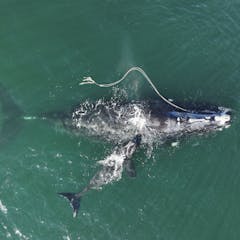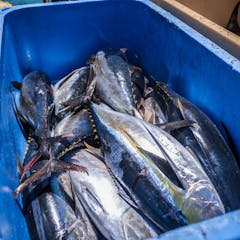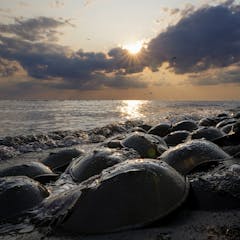
Articles on Fisheries
Displaying 1 - 20 of 207 articles

A widely anticipated Supreme Court ruling will sharply limit federal agencies’ power to interpret the laws that they execute and decide how best to carry them out.

Global ocean temperatures have been at record highs almost daily for over a year, and economies are feeling the heat.

As climate change ravages coastal livelihoods, piracy is on the rise, imperilling seafarers and trade.

States are once again turning to desalination to secure freshwater supplies. The problem is, they’re often choosing the wrong spot for ecosystems and fisheries

A new report has found the marine reserve covering the Heard and McDonald islands must urgently be expanded.

Even when female North Atlantic right whales survive entanglement in fishing gear, it may affect their future ability to breed, increasing the pressure on this critically endangered species.

The toll on wildlife from illegal fishing, bycatch and entanglement in fishing gear is likely underestimated, because it doesn’t account for ‘dark’ fishing vessels, a new study finds.

For years, Australia and New Zealand have been united in working for sustainable fishing in the South Pacific. That just changed.

In our market-driven world, calculating the economic value of the environment can be a useful tool in garnering support for environmental protection.

Recent research shows how reducing overfishing is both an ecological imperative and a critical means to addressing climate change.

Wildebeest herds churning dust. Sturgeon seeking spawning grounds. Shorebirds flying from Siberia. These iconic animal migrations could soon be a memory.

An important but controversial legal doctrine, known as Chevron deference, is at issue in two fishing cases. The outcome could affect many sectors across the nation.

Climate change and overfishing are depleting global fish stocks with clear implications for the food security future of billions of people.

Controlling invasive sea urchins is expensive. Why not make it profitable by fishing for them and selling their roe as a delicacy?

Any plan to dam or extract water from some of Australia’s last wild rivers must carefully consider the consequences. Prawn, mud crab and barramundi fisheries could suffer in the Gulf of Carpentaria.

Breeding tuna in captivity is a promising solution to overfishing, but there are concerns surrounding fish welfare.

Horseshoe crabs play a unique role in medicine, but they’re also ecologically important in their home waters along the Atlantic coast. Can regulators balance the needs of humans and nature?

A new ocean treaty could redirect the unsustainable fishing practices that were happening on the high seas to coastal African nations.

A climate overshoot that creates warmer oceans with lower oxygen levels will reduce the suitable habitat for many marine species long after CO₂ levels have peaked and declined.

Nigeria’s new marine and blue economy ministry has promise but it must be well run.
